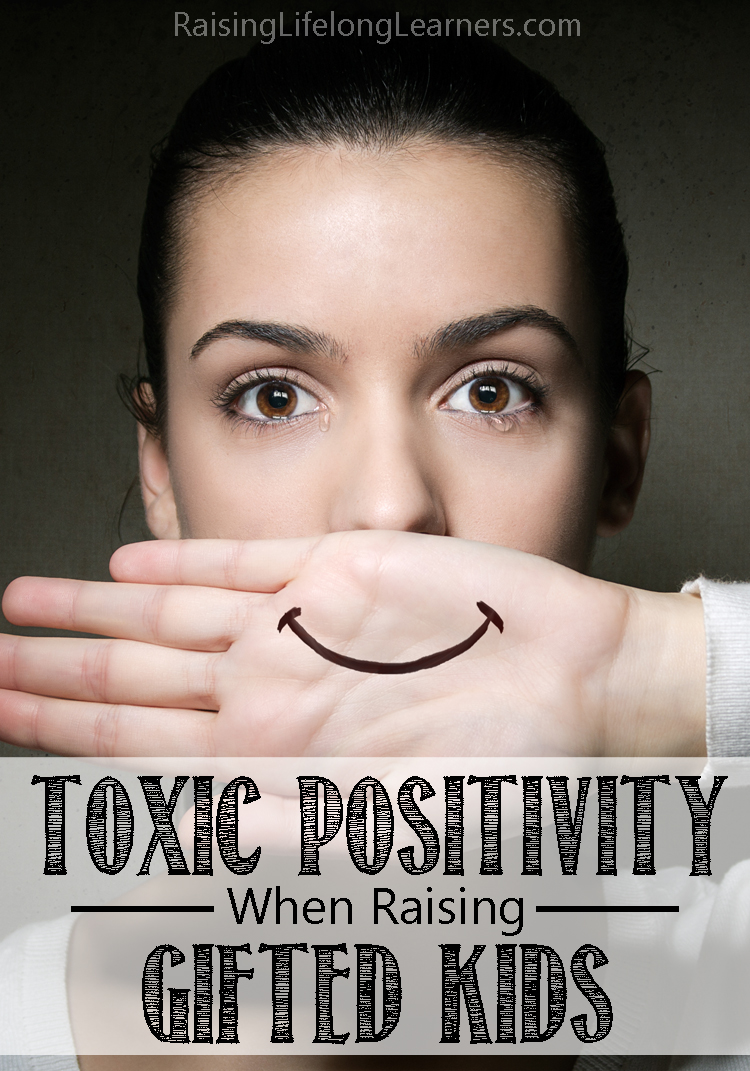Toxic Positivity When Raising Gifted Kids
If only I had a dollar for every time someone found out about my children’s giftedness and scoffed, “Wow, that must be nice.” I’d be quite the wealthy woman. Comments about how easy we must have it when raising such smart kiddos, dismissals of our struggles because our kids must have it so easy, the (false) belief that if our kids are bringing home A’s on all of their tests, there’s nothing really to worry about.
I’ll pause while all you parents of gifted kids finish laughing hysterically.
The truth is that raising gifted kids is often an entirely different experience than sitcoms and stereotypes would have you believe. Because gifted kids are, statistically, so few and far between, parents can find themselves incredibly isolated, misunderstood, and unheard. Even when our friends and family mean well, their words can sometimes make things worse, drive the wedge deeper. We love our kiddos and are enthralled by their uniqueness and abilities, but we still feel the sting of separation when the realities of our experience are dismissed by toxic positivity.
Toxic positivity has made the rounds of late, calling attention to the damage that can be caused by being so insistently positive that real experiences are ignored. Waving off fears or tears with the urging to only think positive thoughts, to only entertain good vibes. Entire storms are ignored while others insist you should be searching for the silver lining among the clouds.
And while having a positive mental attitude is helpful in tackling life’s mountains and valleys, it’s not the only way to make it through. In fact, it’s a pretty ineffective toolbox that relies solely on happy thoughts to fix every problem.
I’ve written a few posts before about the difficulties of raising gifted kids, and have been accused in a handful of comments of complaining about them, some even questioning if I like my gifted kids at all. I absolutely like my kids. I love them. I’m amazed by them. They’re my favorite people and as hard as they are, I’m willing to do whatever they need to be supported and enriched. I love my gifted kids. But I will not pretend that they are always easy.
Toxic positivity and a sometimes overly-affirming culture tell us that they’re not hard, they’re unique, that we shouldn’t be so vocal about our struggles because we’re blessed to have them at all. The outcries are so insistent that we smile and celebrate through every struggle that many are denied the therapeutic and cathartic opportunity to vent, to acknowledge the difficulty, to be reminded that they are not alone and they are not getting the whole parenting thing wrong.
Related: 100 Things to Never Say to the Parent of a Gifted Kid, 2E Or Not 2E? That is the Question
Toxic positivity can come from teachers. I’ve had more than one educator dismiss very valid concerns because my child was doing well in their class, academically. I bring up concerns about possible ADHD and am met with enthusiastic praises about academic performance. I ask about trouble during transition times and am answered with anecdotes about. My worries about emotional intensity and regulation are waved off while prattling on about a wonderfully creative story that was written last week.
I want to know about areas I know to be very real struggles, and am instead fed more compliments, platitudes, comforts I didn’t ask for. Sure, all parents love a good report, and it never stinks to hear someone wax poetic about how wonderful my kids are. But when there are very real concerns at stake, I don’t need teachers to be positive, I need them to be realistic.
Toxic positivity can come from family. Well-meaning grandparents who insist that Einstein didn’t talk for the first few years of his life, so we shouldn’t worry. Aunts who remark that your child couldn’t possibly be dyslexic if they’re gifted. In-laws who wave off tantrums and meltdowns as “phases”, certain that there’s no need to pursue any kind of testing or therapy because they’re sure to grow out of it.
Toxic positivity can come from ourselves.
When we fear that we’re betraying our motherly duties by not gushing over how brilliant our babes are. When we think that our kiddos are so smart that any obstacles that may face will be easily overcome – they’re smart enough to figure it out, after all. When we’re caught up in the romance of quirkiness and unwilling to investigate twice-exceptionalities. When we’re so in over our heads and so at odds with what we thought parenting would be like that we simply smile through it all and push ahead, hoping it’ll eventually get easier. When we tell other parents to be thankful, grateful, instead of vocal with their difficulties and doubts.
Related: Safe Place Fatigue | The Wear and Tear of Being Your Child’s Person, Finding Community | Building a Support System Online and In Person
Toxic positivity is a wolf in sheep’s clothing, the poisonous apple that seems to healthy upon presentation but ends up causing unforeseen damage. None of us want to be Debbie Downer, and we certainly don’t want to be the Negative Nancy anytime our friends are baring their souls and sharing their struggles. But it is entirely possible to be too positive when comforting a worn and weary friend.
Encourage one another, yes. Empower one another with honestly, not ideals. But when a friend is revealing the scared and scarred parts of her heart, don’t gloss over them in an attempt to make her forget them. She’ll go to bed that night with the same fears, and one less person who she feels understands. Don’t insist that everything is okay. Don’t point out the positive to change the subject and distract from the difficult. Let struggling parents speak, and keep in mind that you don’t always have to respond.
Having a support group in place is invaluable when dealing with the struggles of raising gifted and twice-exceptional children. The difficulties are unique and real, and sometimes we need some genuine empathy, not a pep rally. We know how awesome our kids are, they blow us away daily. But we also know how different they are and how often those differences translate into difficulties. And sometimes, just sometimes, we need to be heard – not encouraged, not glossed over, not scolded for leaving behind our happy vibes. Toxic positivity is as real as giftedness, as hard as twice-exceptionalities, and as prevalent as the spectacled math genius stereotype.
Raising these kids is hard, and pretending it’s not won’t make it any easier. But just as true is the fact that these kids bring magic, beauty, wisdom and grace into the messiness of our lives everyday.
Please hear me, the antidote to this toxic positivity is not focusing on what isn’t working. It’s acknowledging the reality and then finding the true positives. It’s not and should never be either or – good or bad, difficult or easy, gifted or not.
As parents of gifted kiddos, our lives are a beautiful blend of all of the above.




